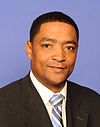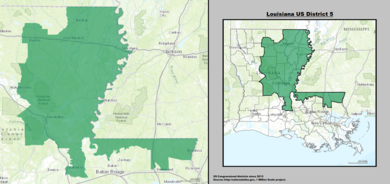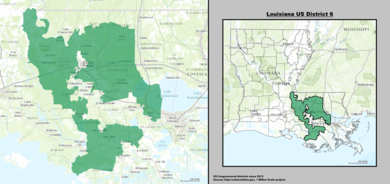United States congressional delegations from Louisiana

These are tables of congressional delegations from Louisiana to the United States House of Representatives and the United States Senate.
House of Representatives
Current Representatives
List of members of the Louisianian United States House delegation, their terms in office, district boundaries, and the district political ratings according to the CPVI. The delegation has a total of 6 members, including 5 Republicans and 1 Democrat.
| District | Representative | Party | CPVI | Incumbent time in office | District map |
|---|---|---|---|---|---|
| 1st |  Steve Scalise (R–Jefferson) Steve Scalise (R–Jefferson)
|
Republican | R+26 | May 3, 2008 – present | 
|
| 2nd |  Cedric Richmond (D–New Orleans) Cedric Richmond (D–New Orleans)
|
Democratic | D+23 | January 3, 2011 – present | 
|
| 3rd |  Charles Boustany (R–Lafayette) Charles Boustany (R–Lafayette)
|
Republican | R+19 | January 3, 2005 – present | 
|
| 4th |  John C. Fleming (R–Minden) John C. Fleming (R–Minden)
|
Republican | R+13 | January 3, 2009 – present | 
|
| 5th |  Ralph Abraham (R–Mangham) Ralph Abraham (R–Mangham)
|
Republican | R+15 | January 3, 2015 – present | 
|
| 6th |  Garret Graves (R–Baton Rouge) Garret Graves (R–Baton Rouge)
|
Republican | R+21 | January 3, 2015 – present | 
|
Delegation timeline (1806 – present)
Tables showing membership in the Louisiana federal House delegation throughout history of statehood in the United States.
1806 - 1811: 1 non-voting delegate
The first non-voting delegate took his seat on December 1, 1806.
| Congress | Delegate at-large |
|---|---|
| 9th (1805–1807) | Daniel Clark |
| 10th (1807–1809) | |
| 11th (1809–1811) | Julien de Lallande Poydras |
1812 - 1823: 1 seat
Statehood was achieved and a representative elected on April 30, 1812.
| Congress | At-large seat |
|---|---|
| 12th (1811–1813) | Thomas B. Robertson (D-R) |
| 13th (1813–1815) | |
| 14th (1815–1817) | |
| 15th (1817–1819) | |
| Thomas Butler (D-R) | |
| 16th (1819–1821) | |
| 17th (1821–1823) | Josiah S. Johnston (Adams-Clay D-R) |
1823 - 1843: 3 seats
Two more seats were apportioned following the 1820 census.
| Congress | District | ||
|---|---|---|---|
| 1st | 2nd | 3rd | |
| 18th (1823–1825) | Edward Livingston (J) | Henry Hosford Gurley (Anti-J) | William Leigh Brent (Adams-Clay D-R) |
| 19th (1825–1827) | |||
| 20th (1827–1829) | |||
| 21st (1829–1831) | Edward Douglass White Sr. (W) | Walter Hampden Overton (J) | |
| 22nd (1831–1833) | Philemon Thomas (J) | Henry Adams Bullard (Anti-J) | |
| 23rd (1833–1835) | |||
| Henry Johnson (W) | Rice Garland (Anti-J) | ||
| 24th (1835–1837) | Eleazer Wheelock Ripley (J) | ||
| 25th (1837–1839) | Rice Garland (W) | ||
| 26th (1839–1841) | Edward Douglass White Sr. (W) | Thomas Withers Chinn (W) | |
| John Moore (W) | |||
| 27th (1841–1843) | John Bennett Dawson (D) | ||
1843 - 1863: 4 seats
A fourth seat was added following the 1840 census.
| Congress | District | |||
|---|---|---|---|---|
| 1st | 2nd | 3rd | 4th | |
| 28th (1843–1845) | John Slidell (D) | Alcée Louis la Branche (D) | John Bennett Dawson (D) | Pierre Bossier (D) |
| Isaac Edward Morse (D) | ||||
| 29th (1845–1847) | Bannon Goforth Thibodeaux (D) | John Henry Harmanson (D) | ||
| Emile La Sére (D) | ||||
| 30th (1847–1849) | ||||
| 31st (1849–1851) | Charles Magill Conrad (W) | |||
| Henry Adams Bullard (W) | Alexander Gordon Penn (D) | |||
| 32nd (1851–1853) | Louis St. Martin (D) | Joseph Aristide Landry (W) | John Moore (W) | |
| 33rd (1853–1855) | William Dunbar (D) | Theodore Gaillard Hunt (D) | John Perkins, Jr. (D) | Roland Jones (D) |
| 34th (1855–1857) | George Eustis, Jr. (K-N) | Miles Taylor (D) | Thomas Green Davidson (D) | John Milton Sandidge (D) |
| 35th (1857–1859) | ||||
| 36th (1859–1861) | J. E. Bouligny (K-N) | J. M. Landrum (D) | ||
| 37th (1861–1863) | Benjamin Flanders (U) | Michael Hahn (U) | American Civil War | |
1863 - 1873: 5 seats
A fifth seat was added following the 1860 census. However, the Civil War prevented them from being seated until July 18, 1868.
| Congress | District | |||||
|---|---|---|---|---|---|---|
| 1st | 2nd | 3rd | 4th | 5th | ||
| 38th (1863–1865) |
American Civil War | |||||
| 39th (1865–1867) | ||||||
| 40th (1867–1869) |
||||||
| Jacob Hale Sypher (R) |
James Mann[2] (D) |
Joseph Parkinson Newsham (R) |
Michel Vidal (R) |
William Jasper Blackburn (R) | ||
| 41st (1869–1871) |
Vacant | Lionel Allen Sheldon (R) |
Chester Bidwell Darrall (R) |
Vacant | Frank Morey (R) | |
| Jacob Hale Sypher (R) |
Joseph Parkinson Newsham (R) | |||||
| 42nd (1871–1873) |
James McCleery (R) | |||||
| Alexander Boarman (Liberal R) | ||||||
1873 - 1903: 6 seats
A sixth seat was added following the 1870 census. From 1873 to 1875, that extra seat was elected at-large statewide. Starting in 1875, however, the state was redistricted into six districts.
1903 - 1913: 7 seats
A seventh seat was added following the 1900 census.
| Congress | District | ||||||
|---|---|---|---|---|---|---|---|
| 1st | 2nd | 3rd | 4th | 5th | 6th | 7th | |
| 58th (1903–1905) | Adolph Meyer (D) | Robert Charles Davey (D) | Robert Foligny Broussard (D) | Phanor Breazeale (D) | Joseph Eugene Ransdell (D) | Samuel Matthews Robertson (D) | Arsène Paulin Pujó (D) |
| 59th (1905–1907) | John Thomas Watkins (D) | ||||||
| 60th (1907–1909) | George Kent Favrot (D) | ||||||
| Albert Estopinal (D) | Samuel Louis Gilmore (D) | ||||||
| 61st (1909–1911) | Robert Charles Wickliffe (D) | ||||||
| Henry Garland Dupré (D) | |||||||
| 62nd (1911–1913) | |||||||
| Lewis Lovering Morgan (D) | |||||||
1913 - 1993: 8 seats
After the 1910 census, Louisiana's delegation reached its largest size, eight seats, which it held for 80 years.
1993 - 2013: 7 seats
After the 1990 census, Louisiana lost one seat.
| Congress | District | ||||||
|---|---|---|---|---|---|---|---|
| 1st | 2nd | 3rd | 4th | 5th | 6th | 7th | |
| 103rd (1993–1995) | Bob Livingston (R) | William J. Jefferson (D) | Billy Tauzin (D) | Cleo Fields (D) | Jim McCrery (R) | Richard H. Baker (R) | Jimmy Hayes (D) |
| 104th (1995–1997) | Billy Tauzin (R) | Jimmy Hayes (R) | |||||
| 105th (1997–1999) | Jim McCrery (R) | John Cooksey (R) | Christopher John (D) | ||||
| 106th (1999–2001) | David Vitter (R) | ||||||
| 107th (2001–2003) | |||||||
| 108th (2003–2005) | Rodney Alexander (D) | ||||||
| 109th (2005–2007) | Bobby Jindal (R) | Charles Melancon (D) | Rodney Alexander (R) | Charles Boustany (R) | |||
| 110th (2007–2009) | |||||||
| Steve Scalise (R) | Don Cazayoux (D) | ||||||
| 111th (2009–2011) | Joseph Cao (R) | John Fleming (R) | Bill Cassidy (R) | ||||
| 112th (2011–2013) | Cedric Richmond (D) | Jeff Landry (R) | |||||
2013 - present: 6 seats
After the 2010 census, Louisiana lost one seat due to stagnant population growth.
| Congress | District | |||||||
|---|---|---|---|---|---|---|---|---|
| 1st | 2nd | 3rd | 4th | 5th | 6th | |||
| 113th (2013–2015) | Steve Scalise (R) | Cedric Richmond (D) | Charles Boustany (R) | John Fleming (R) | Rodney Alexander (R) | Bill Cassidy (R) | ||
| Vance McAllister (R) | ||||||||
| 114th (2015–2017) | Ralph Abraham (R) | Garret Graves (R) | ||||||
Key
United States Senate
Per WP:PSEUDOHEADING fake headings should not be used in articles.
Senator David Vitter (R) | Senator Bill Cassidy (R) |
Senate delegation timeline (1811 – present)
Tables showing membership in the Louisiana federal Senate delegation throughout history of statehood in the United States.
| Class 2 | Congress | Class 3 |
|---|---|---|
| Jean Noel Destréhan (D-R) | 12th (1811–1813) | Allan B. Magruder (D-R) |
| Thomas Posey (D-R) | ||
| James Brown (D-R) | ||
| 13th (1813–1815) | Eligius Fromentin (D-R) | |
| 14th (1815–1817) | ||
| William C. C. Claiborne (D-R) | 15th (1817–1819) | |
| Henry Johnson (D-R) | ||
| 16th (1819–1821) | James Brown (D-R) | |
| 17th (1821–1823) | ||
| 18th (1823–1825) | ||
| Charles Dominique Joseph Bouligny (Adams-Clay Rep.) |
Josiah S. Johnston (Adams, Anti-Jackson) | |
| 19th (1825–1827) | ||
| 20th (1827–1829) | ||
| Edward Livingston (J) | 21st (1829–1831) | |
| 22nd (1831–1833) | ||
| George A. Waggaman (Anti-J) | ||
| 23rd (1833–1835) | ||
| Alexander Porter (Anti-J) | ||
| Robert C. Nicholas (J) | 24th (1835–1837) | |
| Alexander Mouton (J) | ||
| 25th (1837–1839) | ||
| 26th (1839–1841) | ||
| Alexander Barrow (W) | 27th (1841–1843) | |
| Charles M. Conrad (W) | ||
| 28th (1843–1845) | Henry Johnson (W) | |
| 29th (1845–1847) | ||
| Pierre Soulé (D) | ||
| Solomon W. Downs (D) | 30th (1847–1849) | |
| 31st (1849–1851) | Pierre Soulé (D) | |
| 32nd (1851–1853) | ||
| Judah P. Benjamin (W) | 33rd (1853–1855) | |
| John Slidell (D) | ||
| 34th (1855–1857) | ||
| 35th (1857–1859) | ||
| 36th (1859–1861) | ||
| American Civil War | 37th (1861–1863) | American Civil War |
| 38th (1863–1865) | ||
| 39th (1865–1867) | ||
| John S. Harris (R) | 40th (1867–1869) | William P. Kellogg (R) |
| 41st (1869–1871) | ||
| J. Rodman West (R) | 42nd (1871–1873) | |
| 43rd (1873–1875) | Vacant | |
| 44th (1875–1877) | ||
| James B. Eustis (D) | ||
| William P. Kellogg (R) | 45th (1877–1879) | |
| 46th (1879–1881) | Benjamin F. Jonas (D) | |
| 47th (1881–1883) | ||
| Randall L. Gibson (D) | 48th (1883–1885) | |
| 49th (1885–1887) | James B. Eustis (D) | |
| 50th (1887–1889) | ||
| 51st (1889–1891) | ||
| 52nd (1891–1893) | Edward Douglass White (D) | |
| Donelson Caffery (D) | ||
| 53rd (1893–1895) | ||
| Newton C. Blanchard (D) | ||
| 54th (1895–1897) | ||
| 55th (1897–1899) | Samuel D. McEnery (D) | |
| 56th (1899–1901) | ||
| Murphy J. Foster (D) | 57th (1901–1903) | |
| 58th (1903–1905) | ||
| 59th (1905–1907) | ||
| 60th (1907–1909) | ||
| 61st (1909–1911) | ||
| John R. Thornton (D) | ||
| 62nd (1911–1913) | ||
| Joseph E. Ransdell (D) | 63rd (1913–1915) | |
| 64th (1915–1917) | Robert F. Broussard (D) | |
| 65th (1917–1919) | ||
| Walter Guion (D) | ||
| Edward J. Gay (D) | ||
| 66th (1919–1921) | ||
| 67th (1921–1923) | Edwin S. Broussard (D) | |
| 68th (1923–1925) | ||
| 69th (1925–1927) | ||
| 70th (1927–1929) | ||
| 71st (1929–1931) | ||
| Huey Long (D) | 72nd (1931–1933) | |
| 73rd (1933–1935) | John H. Overton (D) | |
| 74th (1935–1937) | ||
| Rose McConnell Long (D) | ||
| Allen J. Ellender (D) | 75th (1937–1939) | |
| 76th (1939–1941) | ||
| 77th (1941–1943) | ||
| 78th (1943–1945) | ||
| 79th (1945–1947) | ||
| 80th (1947–1949) | ||
| William C. Feazel (D) | ||
| Russell B. Long (D) | ||
| 81st (1949–1951) | ||
| 82nd (1951–1953) | ||
| 83rd (1953–1955) | ||
| 84th (1955–1957) | ||
| 85th (1957–1959) | ||
| 86th (1959–1961) | ||
| 87th (1961–1963) | ||
| 88th (1963–1965) | ||
| 89th (1965–1967) | ||
| 90th (1967–1969) | ||
| 91st (1969–1971) | ||
| 92nd (1971–1973) | ||
| Elaine S. Edwards (D) | ||
| Bennett Johnston, Jr. (D) | ||
| 93rd (1973–1975) | ||
| 94th (1975–1977) | ||
| 95th (1977–1979) | ||
| 96th (1979–1981) | ||
| 97th (1981–1983) | ||
| 98th (1983–1985) | ||
| 99th (1985–1987) | ||
| 100th (1987–1989) | John Breaux (D) | |
| 101st (1989–1991) | ||
| 102nd (1991–1993) | ||
| 103rd (1993–1995) | ||
| 104th (1995–1997) | ||
| Mary Landrieu (D) | 105th (1997–1999) | |
| 106th (1999–2001) | ||
| 107th (2001–2003) | ||
| 108th (2003–2005) | ||
| 109th (2005–2007) | David Vitter (R) | |
| 110th (2007–2009) | ||
| 111th (2009–2011) | ||
| 112th (2011–2013) | ||
| 113th (2013–2015) | ||
| Bill Cassidy (R) | 114th (2015–2017) | |
| Class 2 | Congress | Class 3 |
Key
|
|
|
|
|
|
Living former U.S. Senators from Louisiana
As of April 2015[update], there are four former U.S. Senators from the U.S. State of Louisiana who are currently living at this time, three from Class 2 and one from Class 3.
| Senator | Term of office | Class | Date of birth (and age) |
|---|---|---|---|
| Elaine S. Edwards | 1972 | 2 | March 8, 1929 |
| J. Bennett Johnston, Jr. | 1972–1997 | 2 | June 10, 1932 |
| John Breaux | 1987–2005 | 3 | March 1, 1944 |
| Mary Landrieu | 1997–2015 | 2 | November 23, 1955 |
See also
References
- ^ "The national atlas". nationalatlas.gov. Retrieved February 2, 2014.
- ^ Mann's term began on July 18, 1868. He died on August 26, 1868 after just 5 weeks in office. Despite a special election to replace Mann, the House decided to keep the seat officially vacant until the 41st congress. See John Willis Menard.
- ^ Effingham Lawrence, a Democrat, having been permitted permanently to sever Republican Jacob Hale Sypher from the office, served just one day, March 3, 1873, the last business day of the 43rd congress. In the meantime, since Effingham's contested election against incumbent Sypher in 1872, Louisiana's 1st congressional district had elected, as Effingham's replacement, a Democrat, Randall Lee Gibson, a former Confederate Civil War general and later eponym of Tulane University of Louisiana's Gibson Hall.


